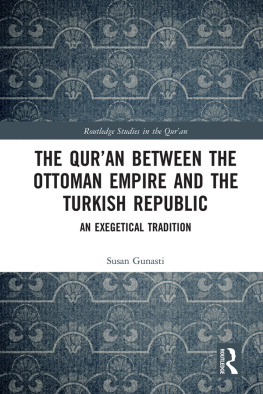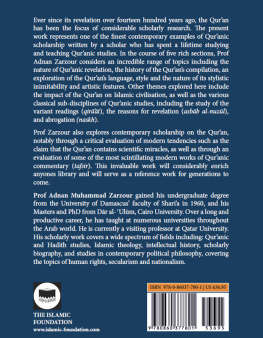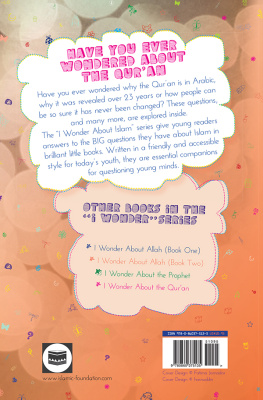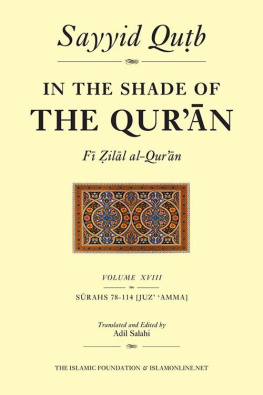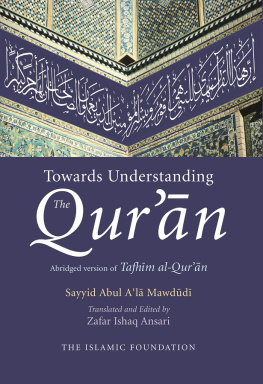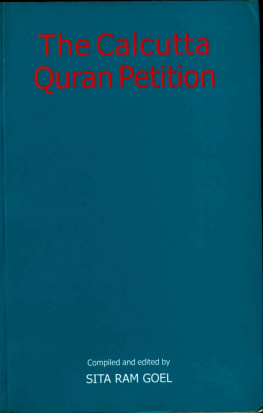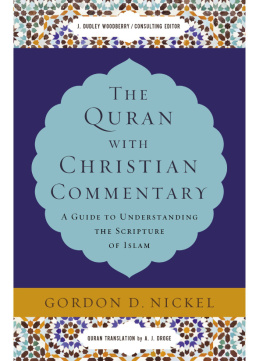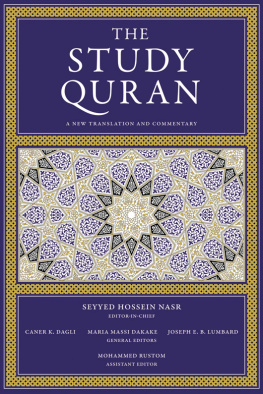The Quran between the Ottoman Empire and the Turkish Republic
The Quran between the Ottoman Empire and the Turkish Republic is one of the few book-length studies on an Ottoman Quran commentary. Its premise is that the Ottoman Empire did not come to an end until 1950 so far as Islam was concerned in Turkey.
The work explores the relationship between Elmalls Quran commentary and the intellectual trends of the period, including the impact of materialism, the sciences, notions of civilizational progress, and philosophy. In doing so, this study emphasizes the local aspect of the Quran commentary, through a sustained focus on the Istanbul context in which it was written. This work demonstrates that Elmalls Quran commentary is a product of and reaction to the religious, intellectual, political, and social trends of the period. This work, in considering all the factors that led to the commissioning of Elmalls Quran commentary, also contributes to our understanding of the history of Islam in early to mid-twentieth-century Turkey.
This intellectual history of modern Islamic thought contributes to our understanding of the genre of Quran commentary in the early twentieth century. It is a key text for students and scholars interested in Islam in the Ottoman Empire and Turkey, modern Islamic thought, and the Middle East.
Susan Gunasti is an associate professor of religion at Ohio Wesleyan University. She obtained her doctorate from Princeton University from the Department of Religion. Her research interests are Quran commentary, Islam in the Ottoman Empire, and Islamic political thought.
Routledge Studies in the Quran
Former Editor:
Andrew Rippin
University of Victoria, Canada
Series Editor:
Walid Saleh
University of Toronto, Canada
In its examination of critical issues in the scholarly study of the Quran and its commentaries, this series targets the disciplines of archaeology, history, textual history, anthropology, theology, and literary criticism. The contemporary relevance of the Quran in the Muslim world and its role in politics and in legal debates are also dealt with, as are debates surrounding Quranic studies in the Muslim world.
The Qurn and the Aramaic Gospel Traditions
Emran Iqbal El-Badawi
Mary in the Quran
A Literary Reading
Hosn Abboud
Shaping a Quranic Worldview
Scriptural Hermeneutics and the Rhetoric of Moral Reform in the Caliphate of al-Mamn
Vanessa De Gifis
Qurnic Studies Today
Edited by Angelika Neuwirth and Michael A. Sells
The Qurn in the Malay-Indonesian World
Edited by Majid Daneshgar, Peter G. Riddell and Andrew Rippin
anw Jawhar and the Qurn
Tafsr and Social Concerns in the Twentieth Century
Majid Daneshgar
The Quran between the Ottoman Empire and the Turkish Republic
An Exegetical Tradition
Susan Gunasti
For more information about this series, please visit: www.routledge.com/middleeaststudies/series/SE0482
The Quran between the Ottoman Empire and the Turkish Republic
An Exegetical Tradition
Susan Gunasti
First published 2019
by Routledge
2 Park Square, Milton Park, Abingdon, Oxon OX14 4RN
and by Routledge
52 Vanderbilt Avenue, New York, NY 10017
Routledge is an imprint of the Taylor & Francis Group, an informa business
2019 Susan Gunasti
The right of Susan Gunasti to be identified as author of this work has been asserted by her in accordance with sections 77 and 78 of the Copyright, Designs and Patents Act 1988.
All rights reserved. No part of this book may be reprinted or reproduced or utilised in any form or by any electronic, mechanical, or other means, now known or hereafter invented, including photocopying and recording, or in any information storage or retrieval system, without permission in writing from the publishers.
Trademark notice: Product or corporate names may be trademarks or registered trademarks, and are used only for identification and explanation without intent to infringe.
British Library Cataloguing-in-Publication Data
A catalogue record for this book is available from the British Library
Library of Congress Cataloging-in-Publication Data
Names: Gunasti, Susan, 1977 author.
Title: The Quran between the Ottoman Empire and the Turkish Republic : an exegetical tradition / Susan Gunasti.
Description: New York, NY : Routledge, [2019] | Series: Routledge studies in the Quran | Includes bibliographical references and index. |
Identifiers: LCCN 2018049238 (print) | LCCN 2018051379 (ebook) | ISBN 9780429442759 (master) | ISBN 9780429810039 (Adobe Reader) | ISBN 9780429810022 (Epub) | ISBN 9780429810015 (Mobipocket) | ISBN 9781138336926 (hardback) | ISBN 9780429442759 (ebook)
Subjects: LCSH: QuranCriticism, interpretation, etc.TurkeyHistory. | QuranCriticism, interpretation, etc.History. | Yazr, Muhammed Hamdi.
Classification: LCC BP130.45 (ebook) | LCC BP130.45 .G86 2019 (print) | DDC 297.1/226092dc23
LC record available at https://lccn.loc.gov/2018049238
ISBN: 978-1-138-33692-6 (hbk)
ISBN: 978-0-429-44275-9 (ebk)
Typeset in Times New Roman
by Apex CoVantage, LLC
To my parents
Contents
Research on this project began as a dissertation at Princeton University. I should especially like to thank Shaun Elizabeth Marmon and kr Haniolu for their support of my work on the dissertation.
I have benefited from the assistance and support of several people in the writing of this book. Antony Greenwood and Glden Gneri played a crucial role in helping me obtain my copy of Mahmud Yazrs manuscript during a research trip in Istanbul. Without their help, I doubt that I would have been able to obtain a copy of this manuscript early on in my work. Benjamin Flhr very generously provided me with a copy of the contract that Elmall and Mehmet kif struck with the Directorate of Religious Affairs at a time when I was unaware of its existence. I have benefited both from his generosity and his work on Elmall. I also benefited from the excellent services of the Interlibrary Loan Department at Beeghly Library at Ohio Wesleyan University, particularly the help of Jillian Maruskin, Sarah Lucas, and Audrey Heisel. Eduard Iricinschi, Nada Moumtaz, and Muhammad Qasim Zaman have provided valuable feedback on parts or the whole of the manuscript. I have benefited tremendously from their comments and generosity, and the work is the better for it. Of course, any problems with the work are no fault of theirs but of my own. Lale Can has listened to me talk about this project from the very beginning and helped me to articulate what it is that I wanted to communicate with my writing. I am also grateful to the anonymous readers of the manuscript. They read it with care and precision and provided very helpful feedback. Finally, I am privileged to have received the support of a scholar from whose work I have benefited and admire: Walid Saleh has been a generous editor and sharp reader of my manuscript. I am very grateful for his insights and encouragement throughout work on this project and for accepting it in this series.
I was able to conduct several research trips in Istanbul thanks to funding that I received from an American Research Institute in Turkey Fellowship and several Thomas E. Wenzlau Grants from Ohio Wesleyan University. I am grateful to these institutions for their support.

